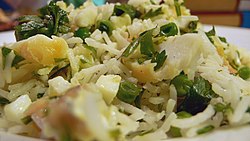Kedgeree
 Kedgeree | |
| Place of origin | India/Scotland |
|---|---|
| Main ingredients | Rice, smoked haddock, eggs, parsley, butter or cream |
Kedgeree (or occasionally kitcherie, kitchari, kidgeree, kedgaree, kitchiri, khichuri, or kaedjere) is a dish consisting of cooked, flaked fish (traditionally smoked haddock), boiled rice, parsley, hard-boiled eggs, curry powder, butter or cream, and occasionally sultanas.
The dish can be eaten hot or cold. Other fish can be used instead of haddock such as tuna or salmon,[1] though these are not traditional.
In India, khichari is any of a large variety of legume-and-rice dishes. These dishes are made with a spice mixture designed for each recipe and either dry-toasted or fried in oil before inclusion. This dish was heavily adapted by the British, developing a dish almost unrecognisable from the original khichari.
History[edit | edit source]
Kedgeree is thought to have originated with the Indian rice-and-bean or rice-and-lentil dish khichuṛī, traced back to 1340 or earlier.[2] It is widely believed that the dish was brought to the United Kingdom by returning British colonials who had enjoyed it in India and introduced it to the UK as a breakfast dish in Victorian times, part of the fashionable Anglo-Indian cuisine.[3]
The dish was listed as early as 1790 in the recipe book of Stephana Malcolm of Burnfoot, Dumfriesshire.[4] The National Trust for Scotland's book The Scottish Kitchen by Christopher Trotter notes the Malcolm recipe and other old examples, expressing the belief that the dish was devised by Scottish regiments hankering for the tastes of India.[5]
Hobson-Jobson cites ibn Battuta (c. 1340) mentioning a dish of munj (mung beans) boiled with rice called kishrī and cites a recipe for khichdi from the Ain-i-Akbari (c. 1590). In Gujarat, where khichdi remains popular, the lentil and rice dish is usually served with kadhi, a spiced yogurt dish that can be mixed with the khichdi. Khichdi is usually not prepared with fish in Gujarat, although fish is sometimes eaten with khichdi in coastal villages where seafood is plentiful. According to Hobson-Jobson, while fish is eaten with kedgeree, the use of the term for "mess of re-cooked fish ... is inaccurate".[6]
The Mughal emperor Aurangzeb was fond of the Alamgiri Khichdi, a variety featuring fish and boiled eggs. Later, during the colonial era, this version of khichdi would go on to be called kedgeree by the British, who took this recipe back to their country. By the 19th century, Kedgeree had become a sophisticated breakfast/brunch dish in England.[citation needed]
See also[edit | edit source]
- Khichdi
- Koshary, a related Egyptian dish
- List of seafood dishes
- List of rice dishes
References[edit | edit source]
- ↑ "Recipe for kedgeree". Scottishrecipes.co.uk. 2007-06-06. Retrieved 2009-03-12.
- ↑ Lobscouse and Spotted Dog; Which It's a Gastronomic Companion to the Aubrey/Maturin Novels, Anne Chotzinoff Grossman and Lisa Grossman Thomas, Norton, 1997, p. 12. ISBN 978-0-393-32094-7
- ↑ Smith, Delia. "Buttery Kedgeree". Delia Smith's Complete Cookery Course. Retrieved 2008-03-10.
- ↑ "Sustainable shore - October recipe - Year of Food and Drink 2015 - National Library of Scotland". nls.uk.
- ↑ Trotter, Christopher (2004). The Scottish Kitchen (1st ed.). London: Aurum Press. p. 49. ISBN 1-85410-979-0.
- ↑ Yule, Sir Henry. "Hobson-Jobson entry on Kedgeree". Hobson-Jobson: A glossary of colloquial Anglo-Indian words and phrases, and of kindred terms, etymological, historical, geographical and discursive. Archived from the original on 2012-07-15. New ed. edited by William Crooke, B.A. London: J. Murray, 1903